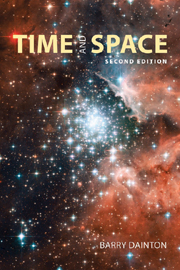Book contents
- Frontmatter
- Contents
- Preface to the second edition
- Preface to the first edition
- 1 Preliminaries
- 2 McTaggart on time's unreality
- 3 The Block universe
- 4 Asymmetries within time
- 5 Tensed time
- 6 Dynamic time
- 7 Time and consciousness
- 8 Time travel
- 9 Conceptions of void
- 10 Space: the classical debate
- 11 Absolute motion
- 12 Motion in spacetime
- 13 Curved space
- 14 Tangible space
- 15 Spatial anti-realism
- 16 Zeno and the continuum I
- 17 Zeno and the continuum II
- 18 Special relativity
- 19 Relativity and reality
- 20 General relativity
- 21 Spacetime metaphysics
- 22 Strings
- Notes
- Glossary
- Web resources
- Bibliography
- Index
10 - Space: the classical debate
- Frontmatter
- Contents
- Preface to the second edition
- Preface to the first edition
- 1 Preliminaries
- 2 McTaggart on time's unreality
- 3 The Block universe
- 4 Asymmetries within time
- 5 Tensed time
- 6 Dynamic time
- 7 Time and consciousness
- 8 Time travel
- 9 Conceptions of void
- 10 Space: the classical debate
- 11 Absolute motion
- 12 Motion in spacetime
- 13 Curved space
- 14 Tangible space
- 15 Spatial anti-realism
- 16 Zeno and the continuum I
- 17 Zeno and the continuum II
- 18 Special relativity
- 19 Relativity and reality
- 20 General relativity
- 21 Spacetime metaphysics
- 22 Strings
- Notes
- Glossary
- Web resources
- Bibliography
- Index
Summary
The last of the magicians
Over the next three chapters we will be examining the debates concerning motion and space in the context of classical Newtonian mechanics. Newton himself will be playing the role of arch-substantivalist and Leibniz the arch-relationist, with Galileo and Descartes fitting uneasily between the two. As far as our space is concerned, this debate has in some respects been rendered redundant by subsequent developments, since Newton's physics has been replaced by Einstein's, but the earlier debate is well worth studying. Not only does it provide useful preparation – recent developments can only be fully understood against the backdrop of the positions from which they emerged – but it is also of interest in its own right, for in considering the different ways that the substantivalist and relationist can account for a basic physical phenomenon such as motion, we learn a good deal about both the character and explanatory resources of the two competing frameworks, and what we learn may well be relevant outside the narrow confines of the classical Newtonian worldview.
Newton's Principia was first published in 1687 (Philosophiae Naturalis Principia Mathematica), and in the opinion of many it is the single most important work in the history of science. Within half a century most scientists were Newtonians, and most were to remain so for the next two hundred years.
- Type
- Chapter
- Information
- Time and Space , pp. 164 - 181Publisher: Acumen PublishingPrint publication year: 2010



